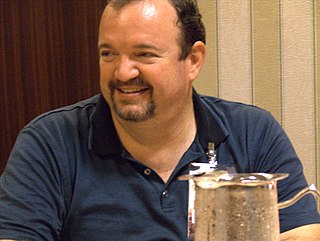A Quote by Jeff Dean
People in my organization were very outspoken about what we should be doing with the Department of Defense. One of them is work on autonomous weapons. That, to me, is something I don't want to work on or have anything to do with.
Related Quotes
If you want to find weapons of destruction, you can find them all over the place. Take, say, Israel. There is a very great concern right now about proliferation of nuclear weapons, as there should be. Israel has a couple of hundred nuclear weapons and also chemical and biological weapons. This stockpile is not only a threat in itself but encourages others to proliferate in reaction and in self-defense. Is anybody saying anything about this?
I hate the thought that someone had picked up one of my song records and was really excited about it, and walks [out of] a record shop with On Land and is disappointed because it isn't what they wanted. So, I try to make signs, graphically and visually, to say to people "Okay, this is this department of my work and this is this other department of my work." And of course I'm very pleased if people like all of them, but I don't want them to feel deceived at any point.
Incidentally, part of a photographer’s gift should be with people. You can do some wonderful work if you know how to make people understand what you’re doing and feel all right about it, and you can do terrible work if you put them on the defense, which they all are at the beginning. You’ve got to take them off their defensive attitude and make them participate.
It makes me so angry when people say, "We never hear from people who are happy doing sex work." Well, that's because they're working. The activism privileges people who hated doing sex work, are no longer doing it, and have a job at a social service organization, for example, that trains them on how to speak to the media. We are hearing from those people quite a bit.
The culture of the State Department is very negative towards a conservative foreign policy. And the model that we all have, of civil servants as neutral careerists who carry out the policy of the elected president, doesn't work nearly the way it should in the State Department. So that there are many people who want to be good civil servants, who want to try and carry out these policies, but are afraid to do so. And I'm not even counting the very small number of conservatives in the State Department who are genuinely at risk.
Actors are not a great breed of people, I don't think. I count myself as something of an exception. I grew up in the theater, and my values were about the work, and not being a star or anything like that. I'm not spoiled in that way, and if I fight for something, it's about the work, not about how big my trailer is.
The most important thing is that, when you work with somebody, you build a rapport with that person. They have a certain trust in you. You don't have to explain that much. It's very hard when you photograph someone who's a fresh face and then you don't work with them again for six months. All these people I work with over and over again have qualities that I love. There's something very free about them or there are some slight imperfections about them. I think the more you work with someone, the pictures get better and better.
What I'm angry about, and I've gone on record saying this, is I think that financiers get away with murder. They realize they can get something for nothing and they won't settle for anything else. There's something called a Schedule F. If I work for a Schedule F contract that basically means I'm doing the movie for free because by the time I pay all my commissions and taxes there's barely anything left for me to live on. This whole notion that you do work that you love for very little money and then you go out and do something you hate to make money.
It's always been very important for me to be surrounded by people. It's never been enough for me to be successful alone. I want to be around people my own age who are also doing things I can learn from. And something Francis Ford Coppola said when we were doing the movie was, "If you learn something about people when you do dinner with them every week, you'll learn a lot more if you play softball with them every week." This is us learning what the climate is creatively among us.
[A] couple I had known - who were old friends - asked me what I was going to work on next. I told them I wanted to write a near future book about AIDS concentration camps. They were vehement in their response: they thought it was a terrible idea. Their words both shocked and saddened me. "Do you really want to write a book about homosexuals?" they asked me. "Won't people who read your work be influenced toward sin?" I notice that I don't hear from them much lately.
In any bureaucratic organization there will be two kinds of people: those who work to further the actual goals of the organization, and those who work for the organization itself. Examples in education would be teachers who work and sacrifice to teach children, vs. union representative who work to protect any teacher including the most incompetent. The Iron Law states that in all cases, the second type of person will always gain control of the organization, and will always write the rules under which the organization functions.
Work begets work. Just work. If you work, people will find out about you and want to work with you if you're good. So work anywhere you can. That's why I've changed my mind about these theatres where people work for free or have to pay money. I think it's kind of terrible that they feel they have to, but you know what? They're working.



































